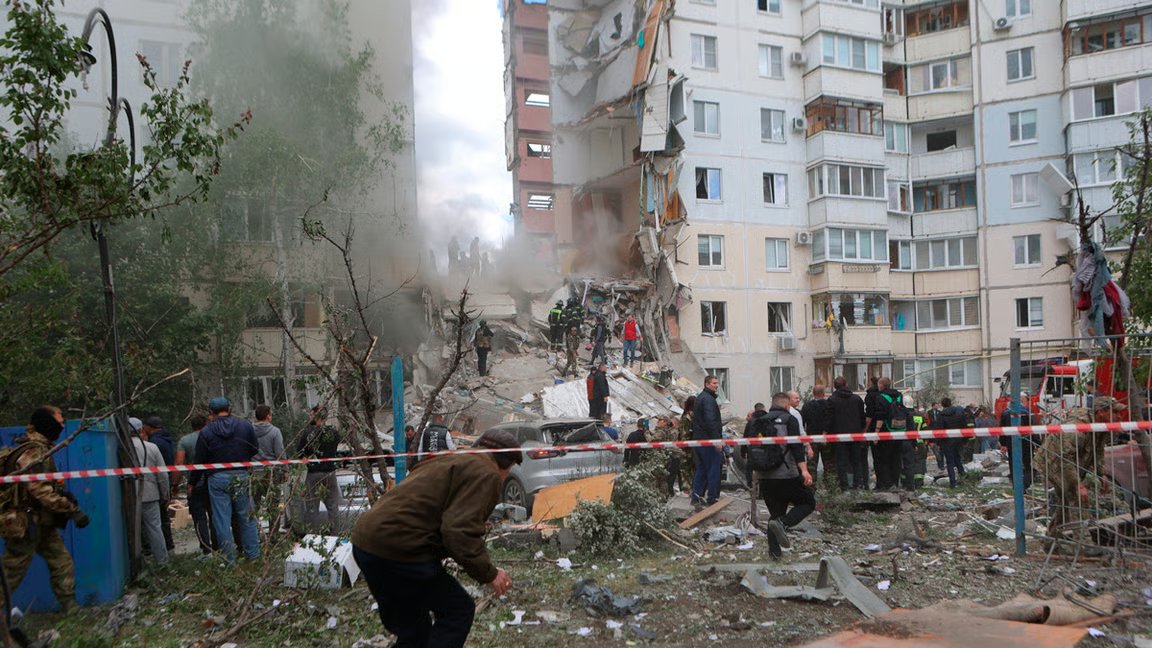When Russian air defences shot down a Ukrainian missile over Belgorod’s city centre in July 2022, the country sat up and took note — it was one of the first Ukrainian airstrikes to cause serious damage and, for the first time, exposed the vulnerability faced by civilians inside Russia, undermining the Kremlin’s oft-repeated mantra that its own population would be impervious to military reprisals despite the country’s full-scale invasion of its neighbour.
As the closest major Russian city to the Ukrainian border, it was perhaps inevitable that Belgorod would become a target for Kyiv’s military retribution, but even the city’s residents hadn’t expected the war to arrive on their doorsteps so quickly.
Within days, Belgorod region Governor Vyacheslav Gladkov warned that the authorities would be unable to afford to fund the reconstruction of all damaged properties, noting that “some people view this as an opportunity for free repairs” and announcing that a family’s income would be taken into account when calculating compensation payments, and that those with “huge houses with big swimming pools” would not qualify for assistance.
Hearing Gladkov’s remarks, most locals wondered exactly where all these mansions with swimming pools were, and many were outraged by the comments. One angry local complained to a regional news outlet that she had bought her house with her own hard-earned money. “The money didn’t fall from the sky, this house is my only home,” she said.
Nevertheless, Gladkov continued his reproach of his constituents, who, he seemed to believe, were attempting to profit from the war. In May, he accused some people of deliberately parking their cars on the street in the hope of receiving compensation should they be damaged by Ukrainian shelling.
Asked to provide evidence of such cases, the governor’s office pointed to a single case in which the owner of a car claimed his vehicle had been damaged on three separate occasions and allegedly tried to pass the same marks off as new damage on successive occasions to boost the payout he was due.
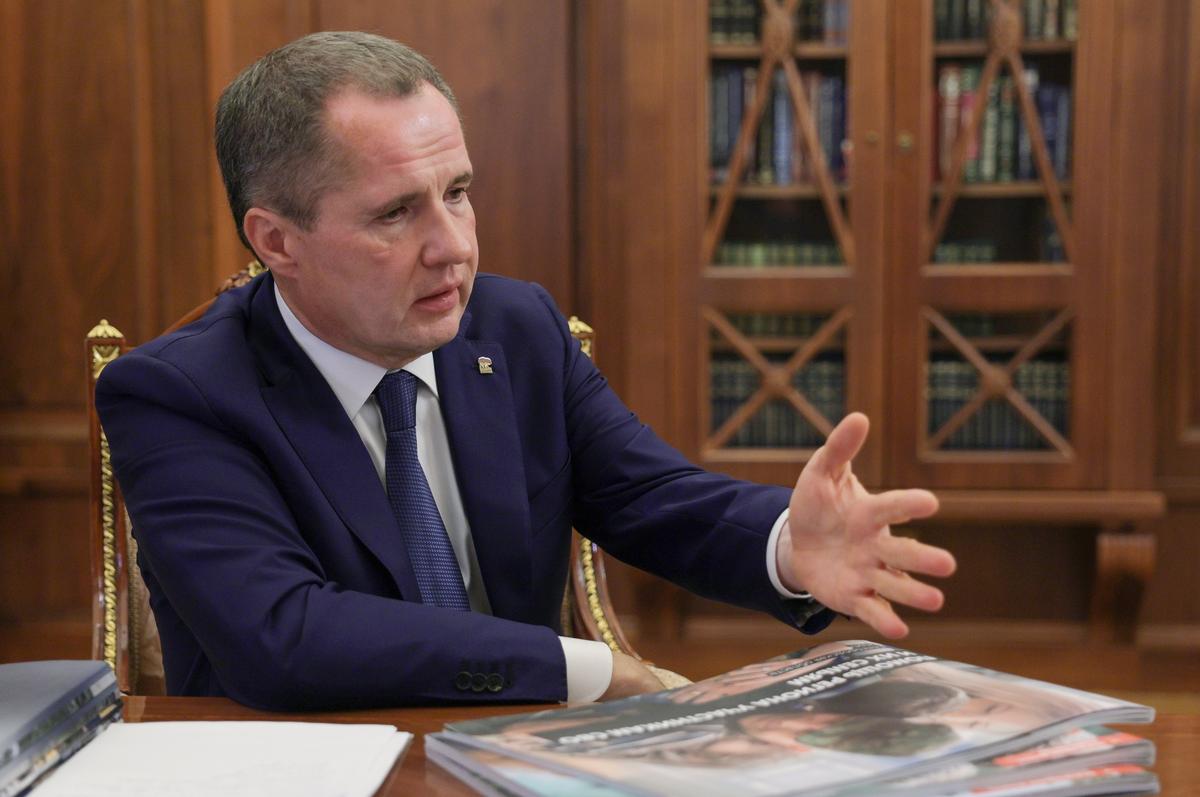
Belgorod Region Governor Vyacheslav Gladkov during a meeting with Vladimir Putin at the Kremlin in Moscow, 11 July 2025. Photo: EPA / MIKHAIL METZEL / SPUTNIK / KREMLIN
According to the Belgorod authorities, there have also been cases of residents damaging their own roofs in order to qualify for new ones, and one resident apparently tried to pass off an old crack in his house for war damage, while another claimed that shelling had been responsible for his wooden window frames rotting.
Gladkov’s assurances of government-funded repairs gradually dwindled over time, however, with the governor first warning of a shortfall in the budget to pay for housing repairs in January 2023, after one resident whose house close to the Ukrainian border was destroyed in shelling attempted to apply for funds for its reconstruction.
Until then, the regional authorities had attempted to restore destroyed or damaged housing stock, however high the cost. In one case, for example, an unlucky home in the village of Novaya Tavolzhanka was damaged six times by shelling, with the Sisyphean task of rebuilding it each time inevitably taking a toll on the regional budget.
“For 10 months, we covered all costs. But a sharp reduction in the regional budget has made that difficult,” Gladkov said in January 2023, adding that he hoped federal assistance would “arrive in the near future” and the necessary work could restart.
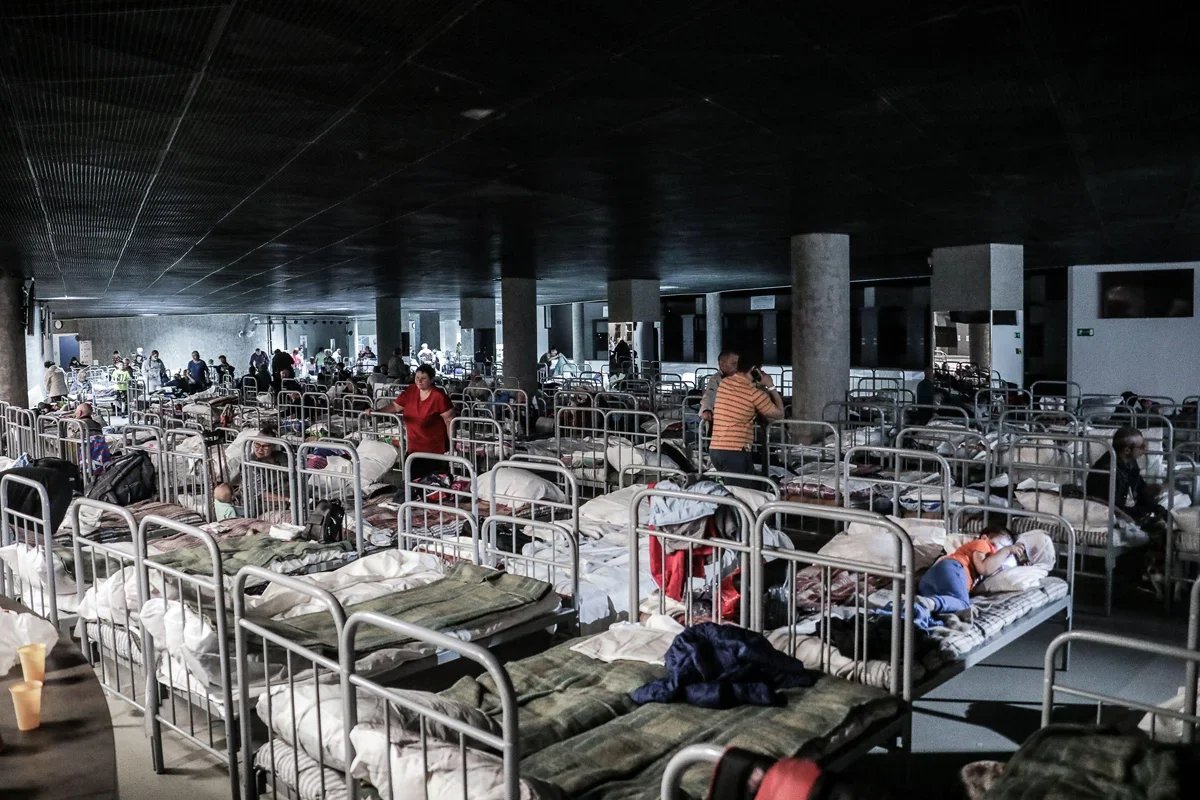
A temporary accommodation centre in Belgorod, western Russia, 1 June 2023. Photo: Picvario Media, LLC / Alamy / Vida Press
About a month later, the federal government did indeed allocate some €100 million to fund the region’s recovery. A little later, the Belgorod government earmarked a further €8.5 million of its own funds for reconstruction efforts.
Assistance from the Russian government was a much discussed topic in Belgorod. After a disastrous summer in 2023 in which the town of Shebekino was all but destroyed, Gladkov estimated that about €212.5 million would be needed to restore it, adding that he was hoping to get federal assistance for the restoration work. However, when Moscow declined to provide the funds, the regional administration was reportedly forced to take out a loan to pay its contractors.
In January 2024, the chair of Belgorod’s regional Duma, Yury Klepikov, pledged that some €87.1 million from the regional budget would be allocated to restoration work over the next three years, and that compensation would also be paid to wounded Belgorod civilians and the relatives of all Belgorod civilians who had been killed in shelling.
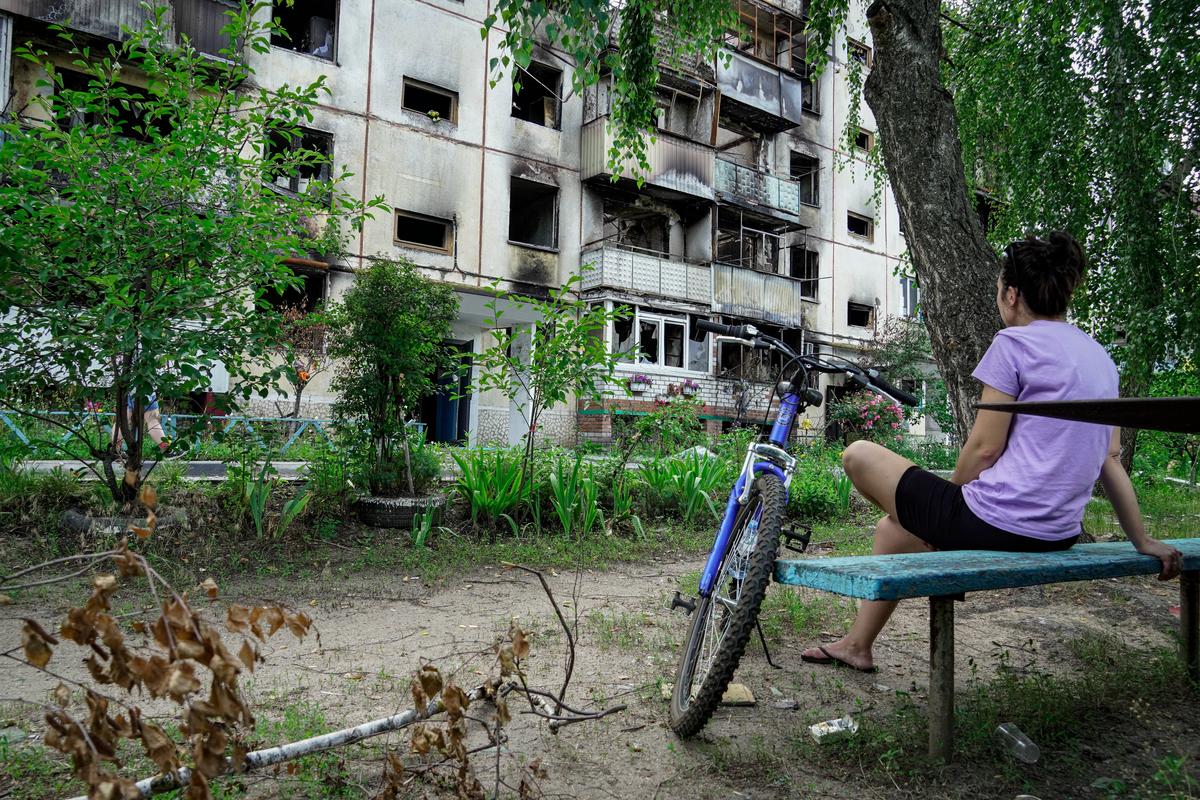
A woman sits in front of a burnt-out apartment block in the Belgorod region town of Shebekino, in western Russia, 2 July 2023. Photo: EPA
In May, Gladkov revised the estimate upwards, saying that another €1.7 billion would be needed for Belgorod’s repair, a colossal sum that far exceeds the region’s entire annual budget. Though a federal programme was created to restore areas impacted by the war, it remains unclear who will ultimately be responsible for footing the bill.
While attempting to stay on top of the devastation wreaked by Ukrainian shelling, the Belgorod authorities are still keen to reduce their overall financial burden by identifying which aid applications they can refuse.
“If people leave the country, why should we deal with their issues first, when there are people who have stayed here, suffered, and worked in extremely difficult conditions?” Gladkov asked somewhat disingenuously in June, as nobody who left the region has had their home rebuilt.
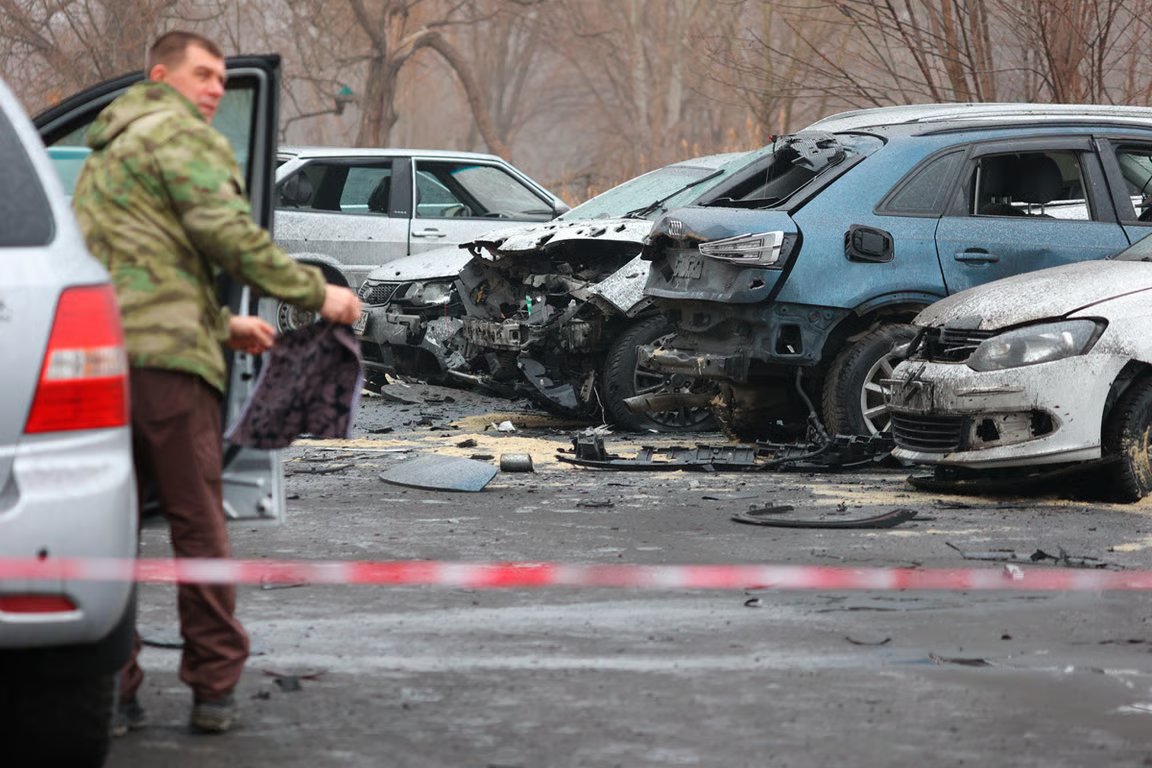
The aftermath of shelling in Belgorod, western Russian, 17 March 2024. Photo: Emil Leegunov / Anadolu / Vida Press
While the Belgorod authorities told Novaya Europe they did not know how many people had left the region in total since 2022, some local journalists mused that Gladkov’s comment could herald a blanket ban on financial aid being granted to rebuild the houses of those who had left the region.
In December, Gladkov berated people forced to live in temporary accommodation centres for not accepting apartments offered to them by the authorities, while Gladkov himself, as Novaya Europe reported in September, lives in a 324-square-metre apartment in central Belgorod that just happens to have been built by one of the major developers being paid to repair houses in the region.
Residents of border villages whose homes have been damaged or destroyed are unable to leave the Belgorod region to live elsewhere in Russia without disqualifying themselves from receiving benefits or compensation. Nor has the region, unlike its neighbours, issued housing certificates, which provide a subsidy to buy a new property.
Nowhere else in Russia has felt the effects of the war like Belgorod, where, to date, over 400 civilians have been killed, 85,000 people have been injured and 48,500 houses have been damaged or destroyed. While the regional government has been forced to take measures to rebuild, rehouse and compensate its long-suffering population, it’s clear that greater financial largesse from Moscow will be necessary if the growing anger and frustration being felt here are to be contained.
